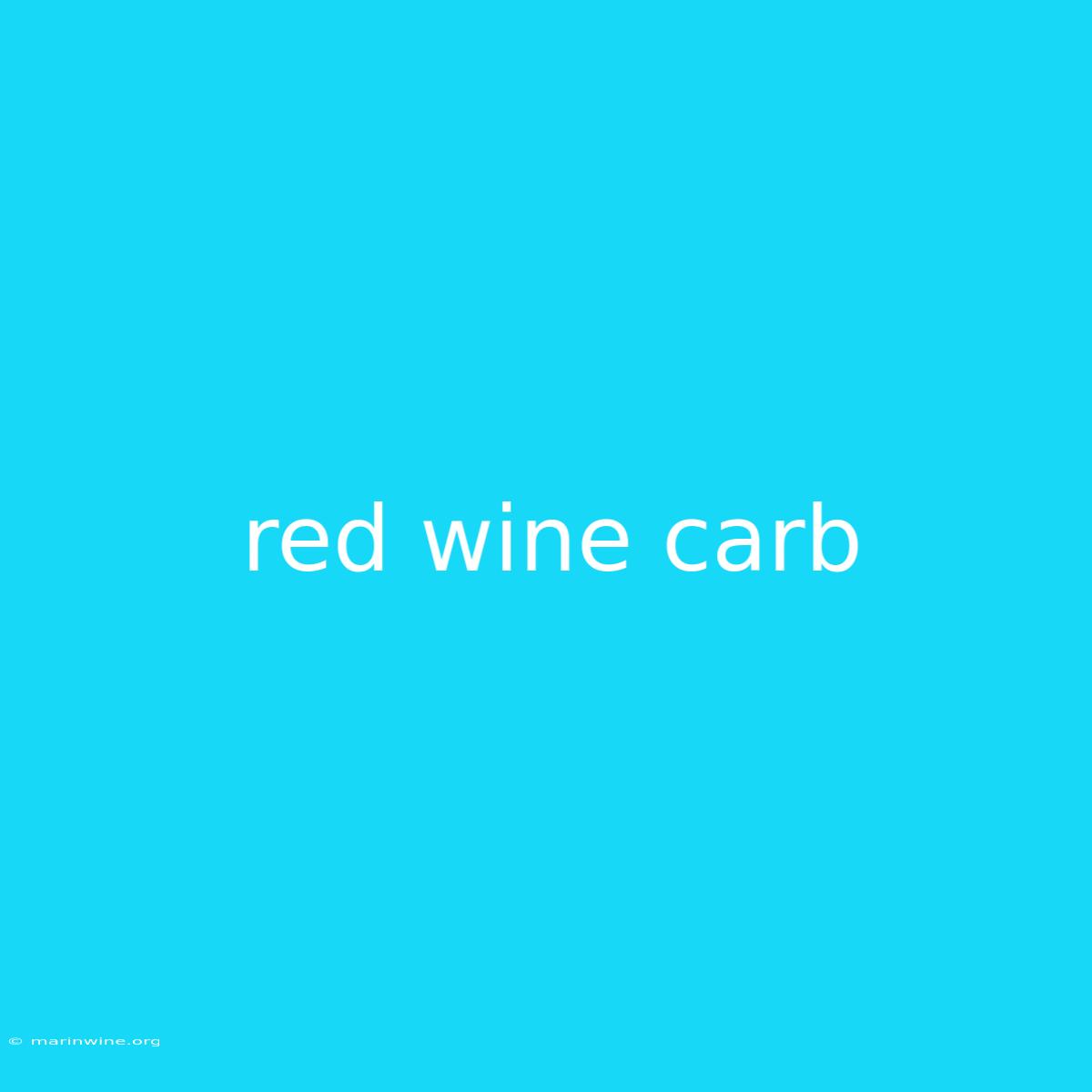Does Red Wine Have Carbs? Uncorking the Truth About Your Favorite Drink
Editor's Note: The question of whether red wine contains carbs is a common one, and the answer may surprise you.
Why It Matters: Understanding the carbohydrate content of red wine is crucial for those following a low-carb diet, managing their blood sugar, or simply curious about the nutritional composition of their favorite beverage. This article will explore the science behind red wine carbs, analyze key aspects, and provide insights to help you make informed choices.
Key Takeaways of Red Wine Carbs
| Key Takeaway | Explanation |
|---|---|
| Red wine contains a small amount of carbohydrates. | The carbohydrate content varies depending on the wine's type, grape variety, and production methods. |
| The majority of carbs in red wine come from natural sugars. | These sugars are primarily fructose and glucose, present in the grapes during fermentation. |
| Alcohol in red wine is not a carbohydrate. | While alcohol provides calories, it's not considered a carbohydrate in the same way as sugars. |
| The carb content of red wine is relatively low compared to other beverages. | A standard 5-ounce serving of red wine typically contains around 4 grams of carbohydrates. |
Red Wine: A Closer Look
Red wine, with its rich flavor and potential health benefits, is enjoyed by many. But its carbohydrate content is often a point of contention for those watching their sugar intake.
Key Aspects of Red Wine Carbs
- Natural Sugars: During fermentation, the yeast converts most of the grape sugars into alcohol. However, a small amount of sugar remains, contributing to the wine's sweetness and overall carbohydrate content.
- Residual Sugar: The amount of residual sugar depends on the winemaking process. Dry wines undergo a longer fermentation process, resulting in lower residual sugar and fewer carbs. Sweet wines, on the other hand, have more residual sugar and higher carbohydrate content.
- Alcohol and Carbs: Alcohol itself isn't a carbohydrate. It provides calories but doesn't affect blood sugar levels in the same way that carbohydrates do.
Carbohydrate Content in Different Types of Red Wine
| Wine Type | Carbohydrate Content (grams/5 oz serving) |
|---|---|
| Dry Red Wine | 2-4 |
| Medium-Sweet Red Wine | 4-6 |
| Sweet Red Wine | 6-8 |
Red Wine and Low-Carb Diets
While red wine contains a small amount of carbohydrates, it's generally considered a low-carb beverage. However, individuals following a strict low-carb diet should consider the following:
- Moderation is key: Even though the carbohydrate content is low, consuming large quantities of red wine can contribute to overall carb intake.
- Choose dry wines: Dry red wines have the lowest carbohydrate content, making them a better choice for those limiting carbs.
- Monitor your blood sugar: Individuals with diabetes or insulin sensitivity should monitor their blood sugar levels carefully after consuming red wine.
Frequently Asked Questions
Q: Is red wine keto-friendly? A: Red wine generally fits within the ketogenic diet, but it's crucial to stay within your daily carbohydrate allowance.
Q: How many carbs are in a glass of red wine? A: A standard 5-ounce serving of red wine contains approximately 2-4 grams of carbohydrates.
Q: Does the type of grape affect the carb content? A: Yes, the grape variety can influence the sugar content of the wine. Some grape varieties, like Cabernet Sauvignon, tend to have a higher sugar content than others.
Q: Is red wine bad for my blood sugar? A: While red wine has a low carbohydrate content, it can still impact blood sugar levels. It's recommended to monitor your blood sugar carefully after consuming red wine.
Q: Can I drink red wine on a low-carb diet? A: Moderation is key. You can enjoy red wine on a low-carb diet, but it's essential to choose dry wines and monitor your carbohydrate intake.
Tips for Enjoying Red Wine on a Low-Carb Diet
- Opt for dry red wines with lower residual sugar content.
- Enjoy a single 5-ounce glass of wine.
- Choose wines with lower alcohol content to minimize calorie intake.
- Pair your wine with low-carb snacks or meals.
- Monitor your blood sugar levels carefully.
Summary by Red Wine Carbs
Red wine, while enjoyed for its flavor and potential health benefits, contains a small amount of carbohydrates. The carbohydrate content varies depending on the wine's sweetness and grape variety. For those following a low-carb diet or monitoring their blood sugar, it's crucial to choose dry wines and practice moderation. With careful consideration and responsible consumption, you can enjoy a glass of red wine without compromising your dietary goals.
Closing Message: Understanding the carbohydrate content of red wine empowers you to make informed decisions about your favorite beverage. By choosing dry wines, practicing moderation, and monitoring your blood sugar levels, you can enjoy the pleasures of red wine while staying within your dietary goals. Remember, a little knowledge goes a long way when it comes to making healthy choices.

